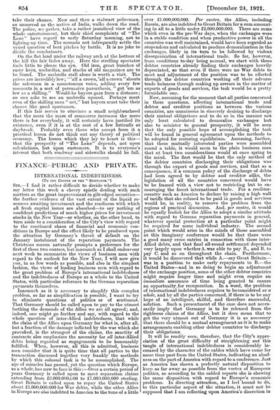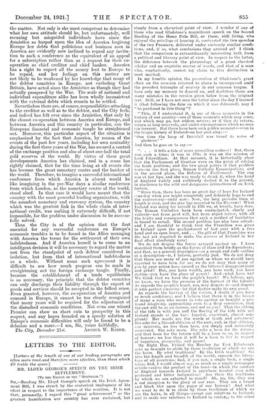FINANCE—PUBLIC AND PRIVATE.
INTERNATIONAL INDEBTEDNESS.
[To THE EDITOR Or TEE " SPECTATOR."] find it rather difficult to decide whether to make my letter this week a cheery epistle dealing with such matters as the great improvement in gilt-edged securities— the further evidence of the vast extent of the liquid re- sources awaiting investment and the readiness with which all fresh capital issues are absorbed—to say nothing of confident predictions of much higher prices for investment stocks in the New Year—or whether, on the other hand, to turn aside to a consideration of the City's view with regard to the continued chaos of financial and economic con- ditions in Europe and the effect likely to be produced upon the situation by Germany's threat of default on the January instalment of the reparation payments. The Christmas season naturally prompts a preference for the first of these two courses, but inasmuch as I shall endeavour next week to summarize the views of business men with regard to the outlook for the New Year, I will now give you, in as few words as possible, and also in the simplest fashion, the views of leading business men with regard to the great problem of Europe's international indebtedness and the indebtedness of Europe as a whole to the United States, with particular reference to the German reparation payments themselves.
Inasmuch as it is necessary to simplify this complex problem, so far as simplification is possible, I want to try to eliminate questions of politics or of sentiment. That Germany should be called upon to pay to the utmost farthing the demands of the Allies we are all agreed; and, indeed, one might go further and say, with regard to the whole question of inter-Allied indebtedness, that while the claim of the Allies upon Germany for what is, after all, but a fraction of the damage inflicted by the war which she provoked; is the strongest of the claims, the sanctity of contracts also emphasizes the necessity for all inter-Allied debts being regarded as engagements to be honourably fulfilled. When, however, all this is admitted, business men consider that it is quite time that all parties to the transaction discussed together very frankly the methods by which this colossal task is to be accomplished. The age of miracles has passed, yet the question which Europe, as a whole, has now to face is this :—Over a certain period of years Germany is called upon to meet reparation claims extending from £6,000,000,600 to £7,000,000,000 sterling. Great Britain is called upon to repay the United States about £1,000,000,000 for War debts, while the other Allies in Europe are also indebted to America to the tune of a little over £1,000,000,000. Per contra, the Allies, including' Russia, are also indebted to Great Britain for a sum amount- ing in all to a little under £2,000,000,000. These are sums which even in the pre-War days, when the exchanges were in a stable condition and when productive power in all the countries was well maintained, would have been regarded as stupendous and calculated to produce demoralization in the exchanges, likely in its turn to be followed by violent, disorganization of international trade. So far, however, from conditions to-day being normal, we start with these debtor countries already finding their exchanges heavily depreciated, so that even if there were no War debts to meet and adjustment of the position was to be effected through the debtor countries working off their adverse trade balances through making up arrears in the matter of exports of goods and services, the task would be a pretty formidable one.
Now, assuming for the moment that all parties concerned in these questions, affecting international trade and debtor and creditor positions as between the various countries, are unanimous in sincerely desiring to discharge their mutual obligations and to do so in the manner not only least calculated to demoralize exchanges but also to minister to general prosperity, it will be seen that the only possible hope of accomplishing the task will be found in general agreement upon the methods to be adopted for restoring equilibrium. Assuming, further, that these mutually interested parties were assembled round a table, it would seem to the plain business man that' at least two considerations would at once spring to the mind. The first would be that the only method of the debtor countries discharging their obligations was through the export of goods and services, and that as a consequence, if a common policy of the discharge of debts had been agreed to by debtor and creditor alike, the legislation of all the countries concerned would have to be framed with a view not to restricting but to en- couraging the freest international trade. For a creditor- country such as America to declare by raising a high wall of tariffs that she refused to be paid in goods and services would be, in reality, to remove the problem from the regions of practical discussion. And, per contra, it would be equally foolish for the Allies to adopt a similar attitude with regard to German reparation payments in general, whatever special protection at a particular point might be required for some individual industry. The second point which would arise in the minds of those assembled' at this imaginary conference would be that there were a good many cross entries in connexion with these inter- Allied debts, and that final all-round settlement depended very largely upon whether A. was able to pay B., and B. to pay C. and so on throughout the chain. Furthermore, it would be discovered that while A.—say Great Britain— was in a position to make early repayments to B.—the United States—and in so doing to begin an adjustment of the exchange position, some of the other debtor countries might require longer time and might even require an immediate assurance of time being granted to ensure an opportunity.for recuperation. In a word, the problem of international indebtedness requires to be considered as a whole, and by all the parties concerned, if there is to be any hope of an intelligent, skilful, and therefore successful, solution. Such a presentment of, the case does-not neces- sarily imply that German7 is to be released from the righteous claims of the Allies, but it does mean that to get the very utmost out of Germany it is as necessary' that there should be a mutual arrangement as it is to make arrangements enabling other debtor countries to discharge their obligations. It will be readily seen, therefore, that the City's appre- ciation of the great difficulty of straightening' out this tangle of international indebtedness is considerably in- creased by the character of the cables which have come for some time past from the United States, indicating an aloof- ness on the part of America with regard to a conference. Just as America has shown a perfectly natural disposition to keep as far away as possible from the vortex of European politics, so according to the cabled reports she is showing the same disposition with regard to Europe's economio' problems. In directing attention, as I feel bound• to do, to this particular aspect of the situation, it must not be supposed that I am reflecting upon America's diseretion in the matter. Not only is she most competent to determine what her own attitude should be, but unfortunately, well meaning but misguided individuals have since the Armistice so harped upon the idea of America forgiving Europe 'her debts 'that politicians and business men in America are evidently now inclined to regard any invita- tion to such a conference as the equivalent of an appeal for a subscription rather than as a request for their co- operation as chief creditor and chief banker. America has a right to expect all the money lent to Europe to be repaid, and her feelings on this matter are not likely to be weakened by her knowledge that many of the debtor countries in Europe, not excluding Great Britain, have acted since the Armistice as though they had actually prospered by the War. The scale of national and individual expenditure alike has been wholly inconsistent with the external debts which remain to be settled.
Nevertheless there are, of course, responsibilities attaching to the creditor as well as to the debtor, and the City feels, and indeed has felt ever since the Armistice, that only by the closest co-operation between America and Europe, and between America and this country in particular, can the European financial and economic tangle be straightened out. Moreover, this particular aspect of the situation is emphasized by the fact that America, by reason of the events of the past few years, including her own neutrality during the first three years of the War, has secured a control of the exchange position and also of about one-hall the total gold reserves of the world. By virtue of these great developments America has claimed, and in a sense has rightly claimed, that for the time being at all events she has become the great monetary centre and the banker of the world. Therefore, to imagine a successful international conference from which America is absent would be like imagining in the pre-War days a similar conference from which London, as the monetary centre of the world, stood aloof. In that case it would have meant that the country with the most powerful lending organization, with the soundest monetary and currency system, the country which was 'the greatest link in the whole chain of inter- national credit, was making it extremely difficult, if not impossible, for the problem under discussion to be success- fully solved.
Thus the City is of the opinion that the first essential for any successful conference on Europe's economic troubles is to be found in the Allies arranging with America the terms for the settlement of their own indebtedness. And if America herself is to come to an intelligent decision it will be necessary to regard the matter not from the standpoint of each debtor considered in isolation, but from that of international indebtedness as a whole. Without some such agreement it is difficult to see how much progress can be made in straightening out the foreign exchange tangle. Finally, because the establishment of a trade equilibrium is so necessary, the principle that the debtor countries can only discharge their liability through the export of goods and services should be accepted in the fullest sense. Even granted, however, the co-operation of America and concord in Europe, it cannot be too clearly recognized that many years will be required for the adjustment of the disturbed economic conditions. Not even our wizard Premier can show us short cuts to prosperity in this respect, and any hopes founded on a speedy solution of Europe's economic difficulties will only be found to be a delusion and a snare.—I am, Sir, yours faithfully,



































 Previous page
Previous page